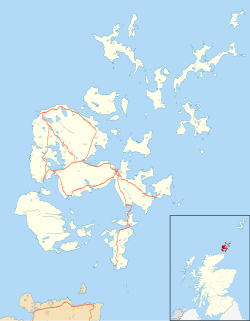| Braeswick | |
|---|---|
 Sanday Light Railway, formerly Britain's most northerly passenger carrying railway, in Braeswick | |
Location within Orkney | |
| OS grid reference | HY608369 |
| Civil parish | |
| Council area | |
| Lieutenancy area | |
| Country | Scotland |
| Sovereign state | United Kingdom |
| Post town | ORKNEY |
| Postcode district | KW17 |
| Dialling code | 01856 |
| Police | Scotland |
| Fire | Scottish |
| Ambulance | Scottish |
| UK Parliament | |
| Scottish Parliament | |
Braeswick is a settlement on the island of Sanday, in Orkney, Scotland. The settlement is within the parish of Cross and Burness, [1] and is situated on the B9070. [2]
